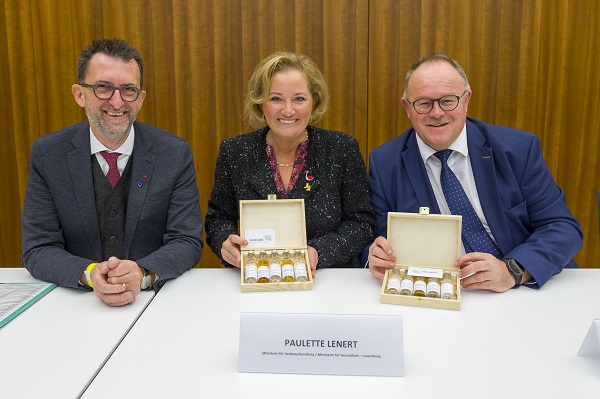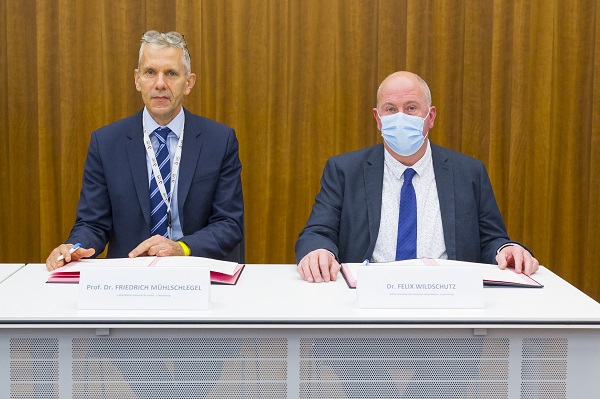 L-R: (Above) Ministers Reinhold Jost (Saarland), Paulette Lenert (Luxembourg) & Romain Schneider (Luxembourg); (below) Prof. Friedrich Mühlschlegel, LNS Director; Dr Félix Wildschutz, Director of Luxembourg's Veterinary Inspection Division;
Credit: SIP / Jean-Christophe Verhaegen
L-R: (Above) Ministers Reinhold Jost (Saarland), Paulette Lenert (Luxembourg) & Romain Schneider (Luxembourg); (below) Prof. Friedrich Mühlschlegel, LNS Director; Dr Félix Wildschutz, Director of Luxembourg's Veterinary Inspection Division;
Credit: SIP / Jean-Christophe Verhaegen
Luxembourg and the German state of Saarland have signed a memorandum of understanding (MoU) aimed at strengthening cross-border collaboration between laboratories involved in food safety.
On the eve of the creation of the Grand Duchy's new veterinary and food agency, Luxembourg's Minister of Consumer Protection, Paulette Lenert, and the Minister of Agriculture, Viticulture and Rural Development, Romain Schneider, together with Saarland's Minister for the Environment and Consumer Protection, Reinhold Jost, visited the infrastructure and equipment of the veterinary medicine laboratory (Laboratoire de Médecine Vétérinaire de l'Etat - LMVE) and the food monitoring service of the department of health protection laboratories of the National Health Laboratory (Laboratoire National de Santé -LNS), which are located on the same site in Dudelange.
The LMVE carries out analyses in the fields of animal health as well as the food safety of foodstuffs of animal origin, while the LNS food surveillance service carries out the official control of other foodstuffs as well as foodstuffs for animals at the request of several administrations and inspection services.
On the sidelines of this visit, the heads of LMVE, the LNS and two laboratories located in Saarland in Germany (Landesamt für Umwelt- und Arbeitsschutz and Landesamt für Verbraucherschutz) signed a MoU, in the presence of Ministers Lenert, Schneider and Jost. The objective of this MoU is to promote the transnational collaboration of laboratories in the Greater Region.
Through their collaboration, the various laboratories are able to combine their skills in order to carry out a wide range of analyses under the best conditions and to ensure food safety more effectively for the consumers concerned.
Throughout the COVID-19 pandemic, these laboratories ensured the continuity of their analyses, thus guaranteeing the maintenance of their systemic importance in the control of foodstuffs.









